こんにちは。フォックス淳子@香港です。あっお呼び出し。
[china 4692] Re: 米誌TIMEの中国特集
> *****
もちろん持っています(何いばってんだか) が、この記事、書いたのは西洋人(SCMP紙北京支局スタッフのMark O'Neillという人)で、内容も、取りあえず嘘じゃないんですが、書き方が産経みたいな感じ。しかも、この記事の北京政府非難は僅か2日後、日本人記者団への朱鎔基首相の例の発言で、まるっきり的外れな指摘となってしまったという大ボケ記事です。
BBSで暴れてるような自称愛国民の若造相手ならともかく、ワタシの愛するチャイナMLの冷静で聡明な中国人参加者の皆さんにお見せするような記事ではないので、後ほどタイプしたら(笑)某掲示板にでも掲載します。どうしてもご覧になりたい方だけお問合せください。
以下、香港ポスト(香港で発行されている日本語紙。週刊)の批判を延々書き出したんですが、思い直して自粛(笑)
---
Junko FOX
[china 4692] Re: 米誌TIMEの中国特集
> *****
もちろん持っています(何いばってんだか) が、この記事、書いたのは西洋人(SCMP紙北京支局スタッフのMark O'Neillという人)で、内容も、取りあえず嘘じゃないんですが、書き方が産経みたいな感じ。しかも、この記事の北京政府非難は僅か2日後、日本人記者団への朱鎔基首相の例の発言で、まるっきり的外れな指摘となってしまったという大ボケ記事です。
BBSで暴れてるような自称愛国民の若造相手ならともかく、ワタシの愛するチャイナMLの冷静で聡明な中国人参加者の皆さんにお見せするような記事ではないので、後ほどタイプしたら(笑)某掲示板にでも掲載します。どうしてもご覧になりたい方だけお問合せください。
以下、香港ポスト(香港で発行されている日本語紙。週刊)の批判を延々書き出したんですが、思い直して自粛(笑)
---
Junko FOX










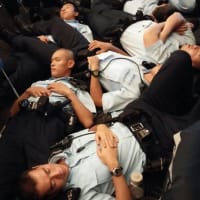
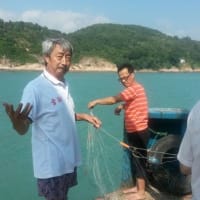


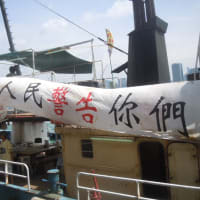
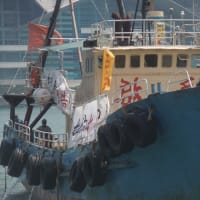
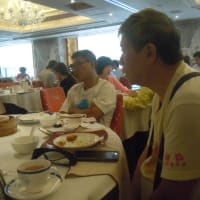
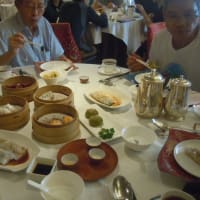
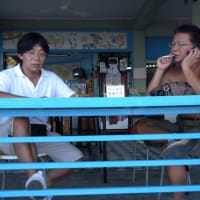
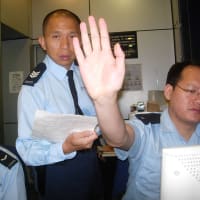
---Japan's past aggressions mean Zhu Rongji's visit will be frosty, but such coldness masks a healthy relationship. Mark O'Neill reports
(South China Morning Post 2000.10.06 p.16 Focus)
"Japanese have killed Chinese and stolen our wealth, from the raids of the dwarf pirates in the 14th century until the present day. Chinese should hit back against Japanese who are without shame and regret and boycott their products.
This was part of a recent conversation in a chat room of Sina.com, China's most popular Web site, sparked by the news that a hacker named Miss Assassin had penetrated the Chinese site of Japanese electronics giant Toshiba and left the slogans: "Annihilate the Japanese devils! Hang their Chinese collaborators."
In some countries, publishing such material would lead to a lawsuit. But not on the mainland, where it appeared in a commentary in the China Youth Daily on why Toshiba should pay millions of dollars in compensation to Chinese clients who are suing it over alleged faults in their computers.
Attacking Japan has been a basic policy of the Communist Party since it was founded in 1921, and continues unabated despite the fact that the injustices committed by Japan occurred at least 55 years ago, before 80 per cent of the Japanese alive today were born. This will ensure the visit to Japan of Premier Zhu Rongji - which begins next Thursday - will be cold and formal.
The mainland media regularly reports "new" evidence of Japanese war crimes, bombs or chemical weapons said to be left behind, the suffering of "comfort women" - the sex slaves used by the Japanese army - and meetings of scholars to discuss Japanese massacres or campaigns during World War II.
Since May, the media has opened a new front in the war - attacking Japanese firms for product faults and discrimination against Chinese. The most violent criticism was reserved for Toshiba which paid US$1 billion (about HK$7.8 billion) to customers in the United States in an out-of-court settlement last year to end a lawsuit by two users who said the floppy-disk control of its computer notebooks could damage storage of data and numbers. It did not admit liability.
After a Chinese Web site published the news on May 8, more than 100 mainland users filed suits against Toshiba. When the company refused to settle, saying that its products were not faulty, the media moved into overdrive, accusing the company of dishonesty, shirking its responsibility and treating the Chinese as second-class people.
Lawsuits have followed against Olympus, Canon and Mitsubishi Motors by consumers who say their products are faulty. These have received wide coverage in the media, accompanied by virulent letters and commentaries.
Why does the Communist Party do this to the country that is its biggest trading partner and source of concessional finance, its fourth-biggest foreign investor and one of its biggest sources of students and tourists? "Beijing's strategy is to repeat again and again the issue of the war, which keeps Tokyo in the position of the guilty party that can neber make amends for its war crimes," said one Asian diplomat. "However much it apologises and however much money it gives is never enough. For most of the post-war period, North and South Korea followed the same policy. For all three countries, Japan provided an easy target to divert public attention from failures at home. Under President Kim Dae-jung, South Korea has changed this policy, but China and North Korea continue it."
But China's Communist leaders refuse to do this for several reasons. One is tradition. The first generation of party leaders, some of whom are still alive, spent the 1931-1945 period fighting Japan, a war from which the party derives much of its legitimacy. A leader perceived as too friendly to Japan would pay a heavy price - this was one of the factors for the dismissal of party chief Hu Yaobang in January 1987.
The second is that the Chinese believe that Japan's emperor and government have not apologised for their war crimes nor explained them to children in their school textbooks.
This is a complicated issue but the opinion of most Chinese is based on misinformation - they are not told of the enormous body of films, books and other material in Japan on every aspect of the war crimes, written by former soldiers, officials, scholars and left-wing activists.
Emperor Akihito and successive Japanese prime ministers have given apologies for their country's wartime behaviour, but Chinese leaders have chosen not to accept them, accusing them of insincerity.
The Chinese public has been told almost nothing about the more than US$23 billion in economic assistance Japan has provided since relations were normalised in 1972, to build ports, railways, dams, oil pipelines and hundreds of other projects - war compensation under another name.
When officials opened the spanking new Beijing airport last year, they omitted in their celebratory speeches to mention that Japan had provided a substantial part of the money. Only after a protest from the embassy was a mention of this included in a memorial stone at the site.
The third reason is that the anti-Japan policy has been a great success - the party attacks Japan ceaselessly but with no adverse result. Japanese firms continue to invest, tourists to visit and the Government to provide loans.
This summer it seemed that Tokyo would finally lose patience, angry that it receives no gratitude for all the money it has given. The ruling Liberal Democrat Party refused to endorse low-interest loans to Beijing because Chinese warships and research vessels had made 17 incursions into Japanese waters this year. But last month the party relented and approved the money.
"Tokyo's diplomacy is loan diplomacy," said a Japanese businessman in Beijing. "Money is its only instrument to engage China. If it did not extend the loans, it would have no voice at all."
---
Mark O'Neill is a member of the Post's Beijing bureau.
Clumsy diplomatic tactics keeping Chinese anger alive
(South China Morning Post 2000.10.21 Letters to the editor)
I refer to the article by your Beijing correspondent Mark O'Neill headlined, "We will not forgive, but we will take your money" (South China Morning Post, October 6).
Mr O'Neill claimed that China used Japanese war guilt to milk Japan financially. In doing so, he trivialised a complex problem.
The central issue governing Chinese-Japanese relations is the invasion and occupation of China in World War II. The hostility shown towards Japan is by no means limited to the Chinese on the mainland, but is felt by all ethnic Chinese who have suffered as a consequence of Japan's acts. The Japanese terror in World War II weakened and distracted the Kuomintang and so it was unable to mount an all-out assault against the Communists. The dislocation and dispersal of millions of Chinese after World War II is due in no small measure to the Japanese invasion of China.
Neither the Japanese emperor nor the government ever apologised for their war crimes. Japanese prime ministers and the present emperor have frequently expressed their regret at the sufferings caused, but never apologised. In the meantime, we have periodic proclamations by cabinet ministers that Japan did nothing wrong China. Americans let the Japanese get away with minimal reparations in 1954, closing the legal door to further compensation.
The fact that Japan never apologised made it impossible to close the books and move forward. Chinese in and outside China view Japan with mistrust, which can turn to anger when goaded. Clumsy diplomatic tactics ensure that Chinese anger is kept alive; witness the spat over the Diaoyu Islands (known as the Senkaku
Islands in Japan). Japan has no diplomatic means at its disposal other than money politics. The quote in Mr O'Neill's article from a Japanese businessman said it all: "Tokyo's diplomacy is loan diplomacy". Investments and loans are means to buy influence. The loans mentioned by Mr O'Neill are concessionary loans, but they still carry interest. Given the exchange rate, the cost to China has been very high.
Japanese textbooks do not admit to an invation, instead using "shinshitsu", meaning, "to enter" another sovereign country, inflict great cruelty, kill millions and say one is merely "entering". And where does Mr O'Neill find all these bodies of work by former soldiers and officials that, according to him, predispose towards Chinese sufferings? One loan ex-soldier has acknowledged Japanese atrocities and travelled to China to apologise for those crimes. Most of the films and published material that I have come across deal more with the suffering of the Japanese themselves. Indeed, if you go to the Peace Museum in Hiroshima, you will find only material which shows the horrors of the war from the Japanese perspective.
Mr O'Neill reports that mainland academics regularly meet to discuss Japanese acts of cruelty committed during World War II. I, for one, am buoyed by these developments. If one compares the amount of scholarship and research done into Germany's role in the Holocaust and acts of hostility in occupied countries, whatever academic work is being done now in China can only be termed belated and worth encouraging. Note that South Korea finally received a full apology for Japan's harsh colonial rule only two years ago.
One can ask why the Chinese Government does not do a better job convincing its people that the Japanese mean well. The Chinese Government cannot get this done single-handedly.
Maybe Japan means well, but like Germany and the Holocaust, it must confront its past critically and with sincerity before it can convince Asian partners, including the Chinese, to move forward with it.
Vera Sinn
Mid-Levels
Peaceful Japan of Today is sincerely remorseful
(South China Morning Post 2000.11.07 Letters to the editor)
I refer to the letter by Vera Sinn headlined, "Clumsy diplomatic tactics keeping Chinese anger alive" (South China Morning Post, October 21).
In responding to several points raised by your correspondent's letter, I would like to present some facts and information relating to how Japan has confronted and continues to confront its past and how both Japan and China are currently working together to establish a successful partnership for the future.
It has been repeatedly suggested by some people in Hong Kong that Japan has neither sincerely apologised for past actions, nor offered any substantial reparations or compensation. This is simply not true. In fact, Japan has clearly and repeatedly expressed its sincere apologies and remorse. In particular, Prime Minister Tomiichi Murayama's statement in 1995, which was based on a cabinet decision and which has subsequently been upheld by successive prime ministers, irrefutably expressed this remorse: "Japan ... through its colonical rule and aggression, caused tremendous damage and suffering to the people of many countries, particularly to those of Asian countries. In the hope that no such mistake be made in the future, I regard, in a spirit of humility, these irrefutable facts of history, and express here once again my feelings of deep remorse and state my heartfelt apology."
Regarding education, Japan is earnestly aware of the importance of history education. There are 33 officially approved history textbooks currently being used in Japanese junior high schools and high schools and all of them extensively cover wartime history. I would also like to point out that in these textbooks the words "invasion [of China]" are used, contrary to the belief of some in Hong Kong.
Concerning reparations, Japan had dealt most sincerely with these issues through the San Francisco Peace Treaty and other bilateral treaties and in terms of the relations between Japan and the relevant countries, issues of reparation have already been legally resolved. In accordance with these treaties, Japan renounced its assets abroad - assets which were estimated to have totalled US$28 billion at the end of the war - and left them in the hands of the countries concerned. Furthermore, Japan subsequently provided 946
billion yen to those same countries in reparations and compensation payments.
In considering the past, it is also important to focus on the present and the future. Japan-China relations are currently on a very firm footing, and both Japanese and Chinese representatives keenly emphasised this during the very successful visit to Japan recently undertaken by Chinese Prime Minister Zhu Rongji. The officials of both countries concurred on the importance of lookings forward through improved co-operation and mutual development and both stressed the importance of Japan and China working positively together for the benefit of future stability and prosperity in the region.
In conclusion, the peaceful Japan of today is sincerely remorseful and is striving to atone for past mistakes. We must not forget the past, but in drawing lessons from history, Japan, and near neighbours including China, are looking to the future with renewed energy and enthusiasm and in a spirit of friendly co-operation.
Tsutomu Kawata
Consul and Director
Information and Cultural Centre
Consulate-General of Japan
Nation not accepting responsibility for war crimes
(SCMP 2000.11.14 Letters to the editor)
http://www.scmp.com/news/Comment/Article/FullText_asp_ArticleID-20001113220118704.asp
Japanese Consul Tsutomu Kawata in his letter headlined, "Peaceful Japan of today is sincerely remorseful" (South China Morning Post, November 7), simplifies the Sino-Japanese relationship to one of friendly co-operation, but fails to settle the blood accounts that are still outstanding.
May I draw his attention to the following:
The "assets abroad" valued at US$28 billion which he counts as compensation to the victims of his country's aggression were the assets of China and other Asian countries in the first place: their land, their slave labour with all its sweat and blood, and their materials. Was it compensation to return them to the countries to whom they belonged?
The 964 billion yen which the consul claimed were given as compensation did not reach the victims, who were not represented in the San Francisco Peace Treaty. Those in Hong Kong who still hold Japanese military money can testify to that, as one example.
The consul says that former prime minister Tomiichi Murayama and others have apologised. Mr Murayama did not say who he represented in offering what appear to have been his personal apologies. The present Emperor, Akihito, when he visited Beijing, merely referred to the brutal slaughter, rape and looting, as "an unfortunate incident". There has been no written apology, no visit of penitence, no solemn memorial service (such as the Emperor pays to Japanese war criminals) in the most devastated cities, such as Nanjing, Shenyang, Liukuchiao, Harbin and other Asian cities. Conscience-stained Japanese such as Azuma Shiro who have shown penitence with tears in such cities have been persecuted recently, their books have been banned and they have been called to court on libel charges. Would the consul see any sign of apology or penitence in these facts?
Concerning teaching the children in their history books that Japan invaded China, we have no way to prove that since we have not seen all school textbooks. But we do know that in the Japanese Government there are still extreme right-wing politicians, members of an organisation calling itself "freedom of history" which deliberately downplays the atrocities committed under the pretext of "protecting Asia".
If Japan is sorry, can the consul explain how more than 30 claims made by victims of various wartime crimes, such as murder, rape, robbery and slave labour, have all failed in Japanese courts?
Moreover, there is still the outstanding question of the Diaoyu islands which historically belong to China.
Perhaps worst of all is the fear created in recent years by Japan's signing of a treaty with the US which gives Japan a role in the protection of Korea, Taiwan and Hong Kong.
It would be a great day in world history if Japan would join the Asian countries in a pact for peace, as equals but not as god-appointed police in the region creating uneasiness and reviving the hatred of war victims.
My organisation is truly eager for all Asian countries to recognise Japan in the Asian family of nations, but first its rulers must settle past accounts.
ANDREW TU
The Chinese Alliance for Commemoration of the Sino-Japanese War Victims
(asahi.com 速報国際欄 2000.11.08 10:24)
http://www.asahi.com/1108/past/pinternational08002.html
英国政府は7日、第2次大戦中に日本軍の捕虜として強制労働など過酷な扱いを受けた英国人の元兵士らに、1人あたり1万ポンド(約160万円)の補償金を支給すると発表した。日本政府に謝罪と補償を求めてきた元捕虜の団体は決定を歓迎しながらも、「日本への謝罪要求は今後も続けていく」と話している。
補償対象は元捕虜と、すでに死亡した元捕虜の配偶者の計1万6700人で、補償総額は1億6500万ポンド(約265億円)になる見通し。
歴代の英政権は他の戦争参加者に同様の補償要求が広がるのを警戒して、この問題を先延ばしにしてきた。だが、ブレア首相は「(日本軍にとらわれた)元捕虜が置かれた苦難と特殊な状況を考慮すれば、特別な措置で報いるのがふさわしい」と述べた。元捕虜の高齢化が進んでいるのと、英国の対日感情悪化の要因にもなっていることから、補償を決断したとみられる。
日本政府はサンフランシスコ講和条約に基づき元捕虜に1人76ポンドを払った。だが、これを不十分として元捕虜と民間人抑留者の2団体が日本政府に損害賠償を求めた裁判が東京高裁で係争中。原告の元捕虜団体代表アーサー・チザリントンさんは「補償は大変喜ばしいが、日本政府ではなく英国政府なのが残念だ。日本はせっかくの正義を示すチャンスを失ったのではないか。今後も、明確な言葉による謝罪と、賠償を求めていくことにかわりはない」と話している。